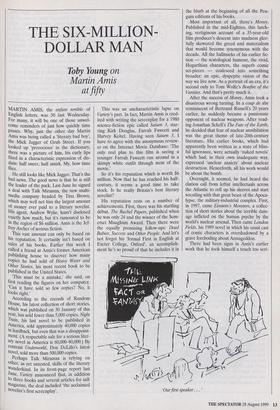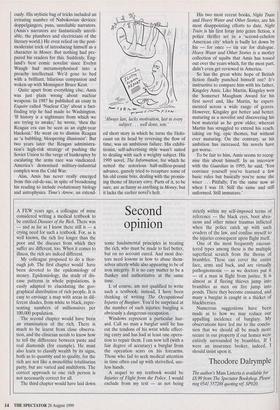THE SIX-MILLION- DOLLAR MAN
Toby Young on
Martin Amis
at fifty MARTIN AMIS, the enfant terrible of English letters, was 50 last Wednesday. For many, it will be one of those unwel- come reminders of just how quickly time passes. Why, just the other day Martin Amis was being called a 'literary bad boy', the Mick Jagger of Grub Street. If you looked up 'precocious' in the dictionary, there was a picture of him, his curly lips fixed in a characteristic expression of dis- dain: half sneer, half smirk. My, how time flies.
He still looks like Mick Jagger. That's the bad news. The good news is that he is still the leader of the pack. Last June he signed a deal with Talk Miramax, the new multi- media company headed by Tina Brown, which may well net him the largest amount of money ever paid to a literary novelist. His agent, Andrew Wylie, hasn't disclosed exactly how much, but it's rumoured to be in the region of $6 million. Amis is the Jef- frey Archer of serious fiction.
. This vast amount can only be based on Ins reputation. It certainly isn't based on sales of his books. Earlier this week I called a friend at Amis's former American publishing house to discover how many copies he had sold of Heavy Water and Other Stories, his most recent book to be published in the United States.
`This must be a mistake,' she said, on first reading the figures on her computer. Can it have sold so few copies? No, it looks right.'
According to the records of Random House, his latest collection of short stories, which was published on 30 January of this Year, has sold fewer than 5,000 copies. Night Train, his last novel to be published in America, sold approximately 40,000 copies in hardback, but even that was a disappoint- ment. (A respectable sale for a serious liter- ary novel in America is 60,000-80,000.) By contrast Underworld, Don DeLillo's latest novel, sold more than 500,000 copies. Perhaps Talk Miramax is relying on other, as yet untested, skills of the literary wunderkind. In its front-page report last June, Variety announced that, in addition to three books and several articles for talk magazine, the deal included 'the acclaimed novelist's first screenplay'. This was an uncharacteristic lapse on Variety's part. In fact, Martin Amis is cred- ited with writing the screenplay for a 1980 science-fiction epic called Saturn 3, star- ring Kirk Douglas, Farrah Fawcett and Harvey Keitel. Having seen Saturn 3, I have to agree with the anonymous review- er on the Internet Movie Database: The only real plus to this film is seeing a younger Farrah Fawcett run around in a skimpy white outfit through most of the movie.'
So it's his reputation which is worth $6 million. Now that he has reached his half- century, it seems a good time to take stock. Is he really Britain's best literary novelist?
His reputation rests on a number of achievements. First, there was his startling debut, The Rachel Papers, published when he was only 24 and the winner of the Som- erset Maugham Award. Then there were the equally promising follow-ups: Dead Babies, Success and Other People. And let's not forget his 'formal First in English at Exeter College, Oxford', an accomplish- ment he's so proud of that he includes it in the blurb at the beginning of all the Pen- guin editions of his books.
Most important of all, there's Money. Published in the mid-Eighties, this lurch- ing, vertiginous account of a 35-year-old film producer's descent into madness glee- fully skewered the greed and materialism that would become synonymous with the decade. All the hallmarks of his earlier fic- tion — the scatological humour, the vivid, Hogarthian characters, the superb comic set-pieces — coalesced into something broader: an epic, dyspeptic vision of the way we live now. As a portrait of an era, it's second only to Tom Wolfe's Bonfire of the Vanities. And that's pretty much it.
After the success of Money, Amis took a disastrous wrong turning. In a coup de tete reminiscent of Bertrand Russell's 20 years earlier, he suddenly became a passionate opponent of nuclear weapons. After read- ing. Jonathan Schell's The Fate of the Earth, he decided that fear of nuclear annihilation was the great theme of late-20th-century literature. His earlier books, which had apparently been written in a state of bliss- ful ignorance, were actually 'nuked novels' which had, in their own inadequate way, expressed 'unclear anxiety' about nuclear destruction. Henceforth, all his work would be about the bomb.
Overnight, it seemed, he had heard the clarion call from leftist intellectuals across the Atlantic to roll up his sleeves and start wrestling with that great beast of the Apoca- lypse, the military-industrial complex. First, in 1987, came Einstein's Monsters, a collec- tion of short stories about the terrible dam- age inflicted on the human psyche by the world's nuclear arsenal. Then came London Fields, his 1989 novel in which his usual cast of comic characters is overshadowed by a grave foreboding about Armageddon.
There had been signs in Amis's earlier work that he took himself a touch too seri- `Our first speaker . . . ' ously. His stylistic bag of tricks included an irritating number of Nabokovian devices: doppelgangers, puns, unreliable narrators. (Amis's narrators are fantastically unreli- able, the plumbers and electricians of the literary world.) He even relied on the post- modernist trick of introducing himself as a character in Money. But nothing had pre- pared his readers for this. Suddenly, Eng- land's best comic novelist since Evelyn Waugh had metamorphosised into a preachy intellectual. We'd gone to bed with a brilliant, hilarious companion and woken up with Monsignor Bruce Kent.
Quite apart from everything else, Amis was just plain wrong about nuclear weapons. In 1987 he published an essay in Esquire called 'Nuclear City' about a fact- finding trip he had made to Washington. `If history is a nightmare from which we are trying to awake,' he wrote, 'then the Reagan era can be seen as an eight-year blackout.' He went on to dismiss Reagan as 'a babbling, bloopering illusionist'. But two years later the Reagan administra- tion's high-risk strategy of pushing the Soviet Union to the verge of bankruptcy by escalating the arms race was vindicated. America's demonised military-industrial complex won the Cold War.
Alas, Amis has never really emerged from this cul-de-sac, in spite of broadening his reading to include evolutionary biology and astrophysics. Time's Arrow, an extend- Always late, lacks motivation, last in every subject . . well done, son.'
ed short story in which he turns the Holo- caust on its head by reversing the flow of time, was an ambitious failure. His exhibi- tionist, self-advertising style wasn't suited to dealing with such a weighty subject. His 1995 novel, The Information, for which he netted the notorious half-million-pound advance, gamely tried to recapture some of his old comic brio, dealing with the promis- ing theme of literary envy. Parts of it, to be sure, are as funny as anything in Money, but it lacks the earlier novel's heft. His two most recent books, Night Train and Heavy Water and Other Stories, are his most disappointing efforts to date. Night Train is his first foray into genre fiction, a police thriller set in a 'second-echelon American city' which is badly let down by his — for once — tin ear for dialogue. Heavy Water and Other Stories is a motley collection of squibs that Amis has tossed out over the years which, for the most part, didn't even get reviewed in America.
So has the great white hope of British fiction finally punched himself out? It's instructive to compare him with his father, Kingsley Amis. Like Martin, Kingsley won the Somerset Maugham Award for his first novel and, like Martin, he experi- mented across a wide range of genres, However, Kingsley got better and better, maturing as a novelist and discovering his best material as he grew older, whereas Martin has struggled to extend his reach, taking on big, epic themes, but without ever maturing. On the contrary, as his ambition has increased, his novels have got worse.
To be fair to him, Amis seems to recog- nise this about himself. In an interview with the Guardian in 1995, he said, 'You convince yourself you've learned a few basic rules but basically you're none the wiser . . . Pitifully, I'm the same now as when I was 18. Still the same and still unformed. Still immature.'



























































 Previous page
Previous page